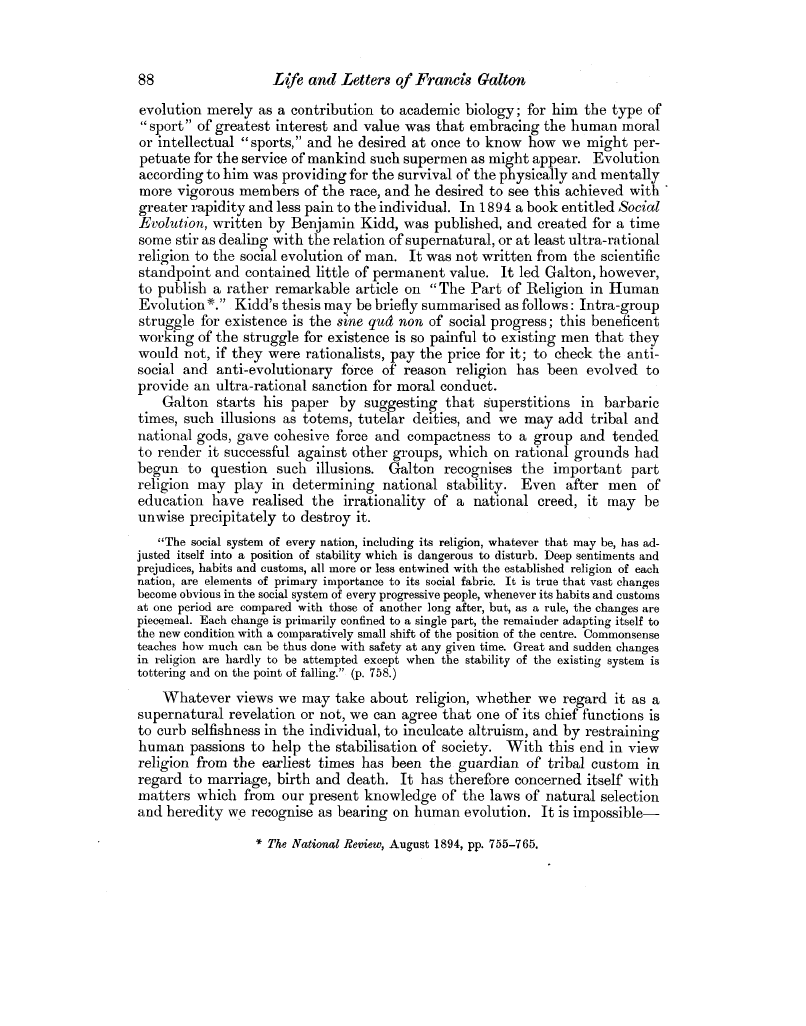| ||||||

OCR Rendition - approximate
88 Life and Letters of Francis Galton evolution merely as a contribution to academic biology; for him the type of "sport" of greatest interest and value was that embracing the human moral or intellectual "sports," and he desired at once to know how we might perpetuate for the service of mankind such supermen as might appear. Evolution according to him was providing for the survival of the physically and mentally more vigorous members of the race, and he desired to see this achieved with ' greater rapidity and less pain to the individual. In 1894 a book entitled Social Evolution, written by Benjamin Kidd, was published, and created for a time some stir as dealing with the relation of supernatural, or at least ultra-rational religion to the social evolution of man. It was not written from the scientific standpoint and contained little of permanent value. It led Galton, however, to publish a rather remarkable article on "The Part of Religion in Human Evolution*." Kidd's thesis may be briefly summarised as follows : Intra-group struggle for existence is the sine qua non of social progress; this beneficent working of the struggle for existence is so painful to existing men that they would not, if they were rationalists, pay the price for it; to check the antisocial and anti-evolutionary force of reason religion has been evolved to provide an ultra-rational sanction for moral conduct. Galton starts his paper by suggesting that superstitions in barbaric times, such illusions as totems, tutelar deities, and we may add tribal and national gods, gave cohesive force and compactness to a group and tended to render it successful against other groups, which on rational grounds had begun to question such illusions. Galton recognises the important part religion may play in determining national stability. Even after men of education have realised the irrationality of a national creed, it may be unwise precipitately to destroy it. "The social system of every nation, including its religion, whatever that may be, has adjusted itself into a position of stability which is dangerous to disturb. Deep sentiments and prejudices, habits and customs, all more or less entwined with the established religion of each nation, are elements of primary importance to its social fabric. It is true that vast changes become obvious in the social system of every progressive people, whenever its habits and customs at one period are compared with those of another long after, but, as a rule, the changes are piecemeal. Each change is primarily confined to a single part, the remainder adapting itself to the new condition with a comparatively small shift of the position of the centre. Commonsense teaches how much can be thus done with safety at any given time. Great and sudden changes in religion are hardly to be attempted except when the stability of the existing system is tottering and on the point of falling. (p. 758.) Whatever views we may take about religion, whether we regard it as a supernatural revelation or not, we can agree that one of its chief functions is to curb selfishness in the individual, to inculcate altruism, and by restraining human passions to help the stabilisation of society. With this end in view religion from the earliest times has been the guardian of tribal custom in regard to marriage, birth and death. It has therefore concerned itself with matters which from our present knowledge of the laws of natural selection and heredity we recognise as bearing on human evolution. It is impossible * The National Review, August 1894, pp. 755-765.
|